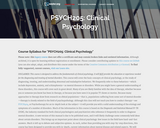
This course will cover the basic concepts of clinical psychology -- the study of diagnosing, treating, and understanding abnormal and maladaptive behaviors. Much of the information in this course is based on the Diagnostic Statistical Manual IV-TR (DSM), which is the industry standard for both clinical psychologists and psychiatrists. Few issues in the field have hard-and-fast answers. As such, rather than providing you with step-by-step directions, this course has been designed to assist you in making educated decisions when diagnosing and treating a mental disease. Upon successful completion of this course, students will be able to: Describe the historical context of the emergence of clinical psychology; Demonstrate an awareness of the differences between mental health professionals in the broad field of clinical psychology; Identify the subspecialty areas within clinical psychology (i.e., community psychology, health psychology, and neuropsychology); Define the main tasks of the clinical psychologist and explain how the contributions of this subspecialty fit into or relate to the broader field of psychology; Define the criteria for what is considered 'abnormal' versus 'normal' and explain how these definitions fit into the notion that psychopathology exists on a continuum; Compare/contrast the different types of psychotherapy treatments; Discuss the ethical considerations related to the practice of psychotherapy; List the main diagnostic features of a variety of mental disorders (i.e., mood disorders, schizophrenia, etc.); Identify the potential factors that may contribute to the instigation and persistence of mental illness for individuals across the lifespan (i.e., children, adults, and older adults). (Psychology 205)
- Subject:
- Psychology
- Social Science
- Material Type:
- Assessment
- Full Course
- Homework/Assignment
- Lecture
- Reading
- Syllabus
- Provider:
- The Saylor Foundation
- Date Added:
- 04/29/2019



